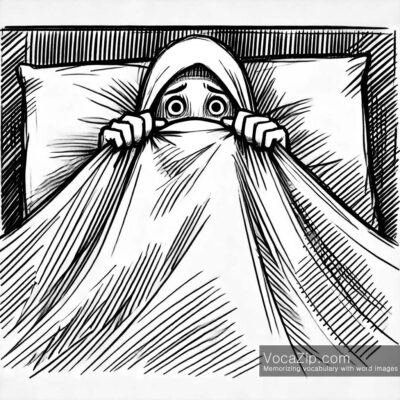scare meaning
scare :
fright, fear
noun
▪ She had a scare when she heard the loud noise.
▪ She felt fear when she heard the loud noise.
▪ The movie gave me a good scare.
▪ The movie gave me a good fear.
paraphrasing
▪ fright – scare
▪ terror – fear
▪ alarm – scare

scare :
frighten, intimidate
verb
▪ He scared the children with his costume.
▪ He frightened the children with his costume.
▪ The loud noise scared him.
▪ The loud noise frightened him.
paraphrasing
▪ frighten – scare
▪ intimidate – scare
▪ alarm – scare
Pronunciation
scare [skɛər]
The word is pronounced with one syllable, sounding like "skair".
Common phrases and grammar about scare
scare - Common meaning
noun
fright, fear
verb
frighten, intimidate
Part of Speech Changes for "scare"
▪ scared (adjective) – frightened
▪ scaring (verb) – causing fear
Common Expressions with "scare"
▪ give someone a scare – frighten someone
▪ scare away – make someone go away through fear
▪ scare easily – become frightened easily
▪ scare stiff – frighten someone completely
Important examples of scare in TOEIC
Vocabulary examples from the TOEIC test
In TOEIC vocabulary questions, scare is often used to describe causing fear or frighten someone in various contexts.
Example of a confusing word: scar (to mark)
Grammar examples from the TOEIC test
As a verb, scare is used to indicate the action of causing fear, often requiring an object.
scare
Idioms and fixed expressions in TOEIC
sudden scare
a quick, unexpected fright used when something happens suddenly.
cold sweat
means to sweat from fear, used to describe physical reactions to fear.
Differences between similar words and scare
scare
,
fright
differences
Scare is used when referring to causing fear, while fright can imply a more intense or sudden fear.
scare
,
terror – fright
differences
Scare refers to causing fear, while terror implies a more intense or overwhelming fear.
Words with the same origin as scare
The origin of scare
The word 'scare' originates from the Old Norse word 'skrækja,' which means to frighten.
Word structure
It is a standalone word without a clear prefix or suffix. The composition of the word is unclear.
Words with the same origin
The root of scare is unclear or difficult to confirm.
Please select an image in the quiz
Previous post and next post


reparation
1048
compensation, amends
noun ┃
Views 2






